Matt Best on battling injury, chasing Coldplay and Tonight Alive's shock new direction
Tonight Alive drummer reveals all on the band's new sound
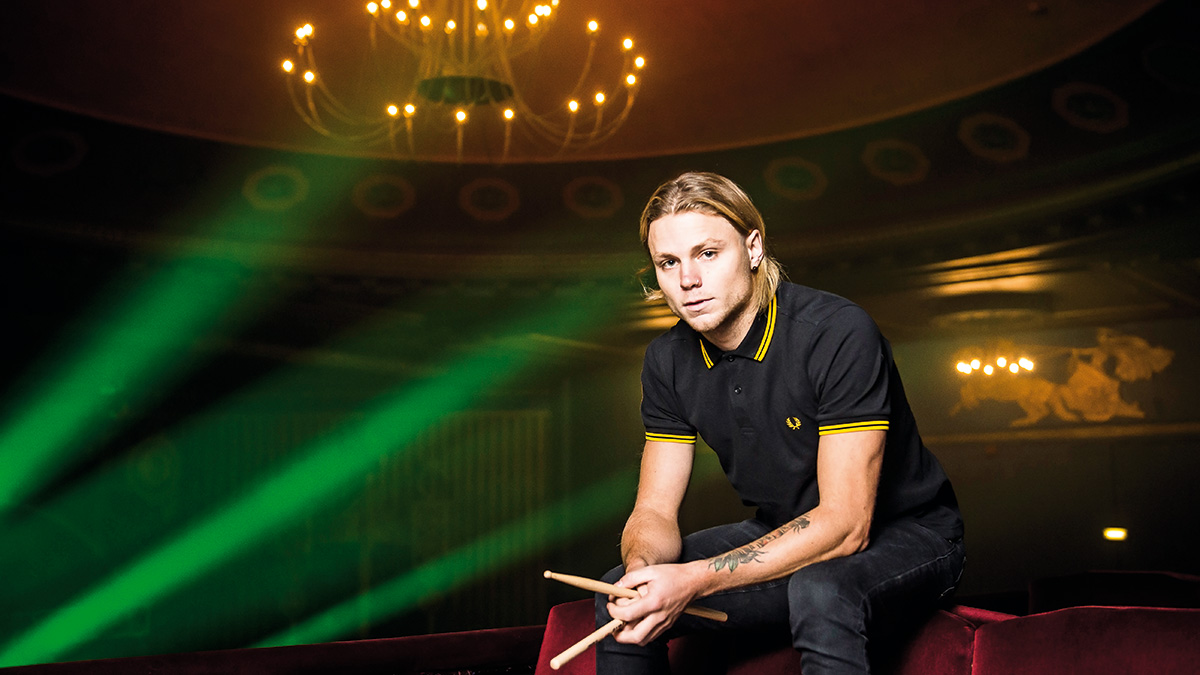
Matt Best on battling injury, chasing Coldplay and Tonight Alive's shock new direction
Picture the scene. You're in a band that has built up a rabid following off the back of two hit pop punk albums.
A big third record would surely push you into arena status. So what do you do? Well if you're Australian fivesome Tonight Alive, you ditch your tried-and-trusted sound and dart off in a new direction.
While the band was writing and tracking the make-or-break Limitless, Best was deep in his own personal hell thanks to a chronic wrist injury.
It may sound crazy, but as drummer Matt Best explains, there's method in the madness. Limitless sees Best and co sidestep the snot-nosed pop for a more mainstream, arena rock sound, a vibe that he later tells us is taking its cues from Coldplay and The Script rather than Paramore and Green Day.
Pressure
Hence the frenetic pop rock has been dialed back, with slow-burner arena-chasing tunes in abundance. When the band does hit top gear, as in single 'How Does It Feel?', there's a greater whiff of Evanescence and even hints of early 2000s nu metal rather than the sound that has helped Tonight Alive break the Top 40 all over the globe.
While the pressure of delving headfirst into a new musical direction would be enough for most twenty-something sticksmen, Best had plenty more on his plate as 2015 rolled into 2016. While the band was writing and tracking the make-or-break Limitless, Best was deep in his own personal hell thanks to a chronic wrist injury.
The drummer himself admits that a year off would have been the best way to get back to full fitness, but instead Tonight Alive's relentless schedule saw him tackle world tours and recording sessions while still in a whole heap of pain.
When we speak with Best it's that daring change in musical direction that we want to get to to right off the bat.
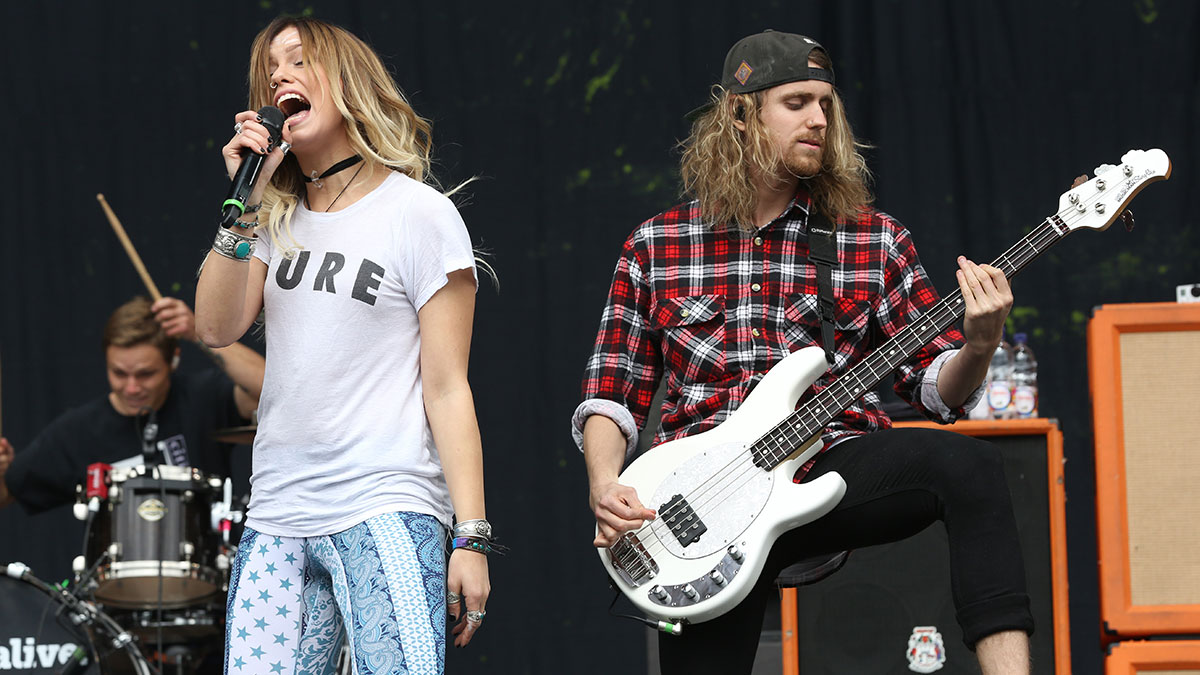
"We wanted to do something groundbreaking."
Limitless sees Tonight Alive take a different musical approach. Why did you decide to go that route?
“This is our third full length so we've been running for a few years now. This album is the biggest leap in our career. Our first two albums in a sense were pretty safe records in that we stuck to the pop rock kind of thing.
“We'd been writing for a while for this album and we could have gone into a studio and recorded an album similar to our last album but we realised we didn't want to do that. We didn't want to be a safe band anymore. We wanted to make music that was different and would take us to the next step in our career so we decided to bin all of the songs we had written and go back and write all over again.
“We decided on working with [producer] David Bendeth and we went into the studio not knowing what was going to happen. He pretty much put his through boot camp and we came out with all these great songs. We wanted that atmospheric euphoric feeling with the songs targeting the commercial pop demographic in a couple of songs, but without losing our rock aspect.”
"Coldplay was a huge influence that we kept coming back to."
Abandoning a sound that has brought you success seems like a brave move
“We weren't comfortable releasing the same old thing. We wanted to do something groundbreaking. You can hear that on this album and when we play these songs live. The response to them has been amazing. We've had a couple of the internet trolls but on the whole it has been amazing. These songs will provide the perfect platform for us.”
It sounds like you were going for more mainstream rock, is that a fair statement?
“Bands rather than drummers were the influence for this album, bands and the sounds they get. Coldplay was a huge influence that we kept coming back to, as well as bands like The Script. That was the direction we were heading towards for these new songs.
“Like Coldplay was a reference we used for Oxygen. Instead of going for a frantic pop punk feel we went more arena rock with soaring guitars, the big flam drums and big kick drums. To Be Free and How Does It Feel? are great examples of that.”
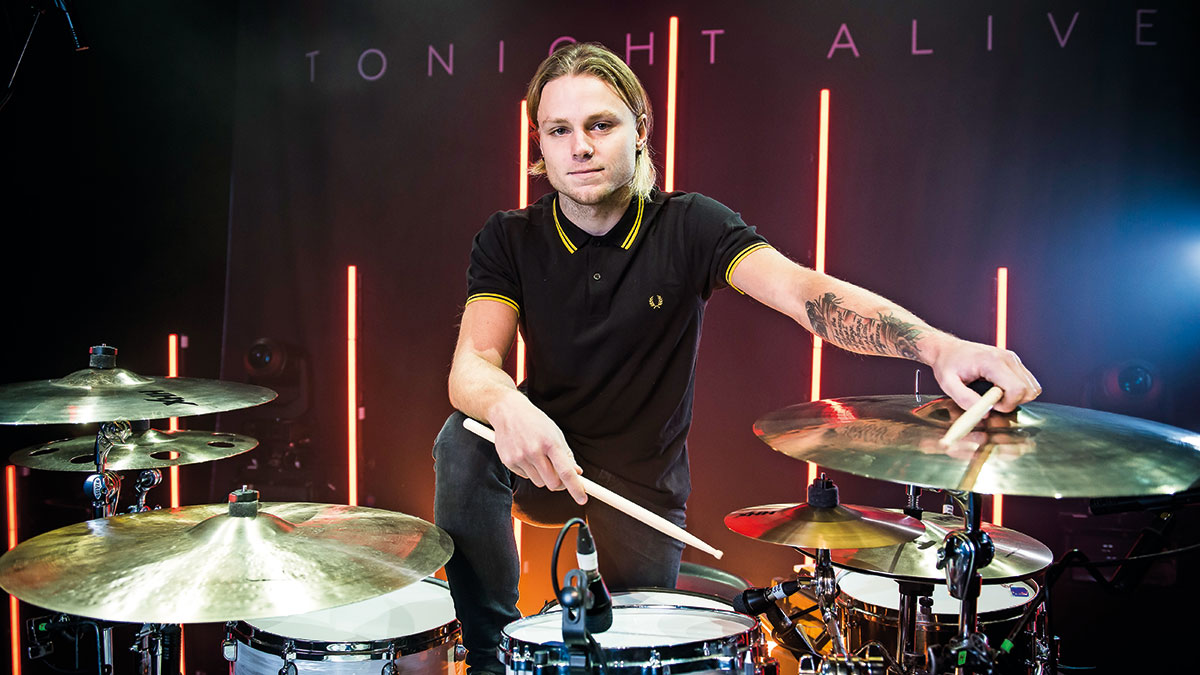
"I fell back in love with drums."
What kind of impact did the shift in sound have on your playing?
“It's had a big impact. Bendeth really turned the way we thought about playing a song around, especially for me. In pre-production we usually go in, we've got the songs finished and we just rehearse. He tore the songs to shreds and honed in on everything I was doing.
“I fell back in love with drums. We'd been touring so much that it had all become a bit monotonous for me. I was still enjoying playing live but you don't get much time on tour to practice and work on your chops.
"This is a turning point in my drumming career.”
“We got into pre-pro and Bendeth sat down with me and kind of taught me how to listen to songs in a new light. It helped let every instrument breathe and let Jenna's vocals soar. It was a big learning curve. I just want to keep learning now. You can hear it on the album as well, the whole less is more. This is a turning point in my drumming career.”
Has changing your style had an impact on the way you play old songs live?
“When we play old songs live now I go, 'What was I thinking with all these parts and fills?!' The new songs are so well built. There's moments for a fill to shine in these songs. Instead of doing a fill I might just do a flam, things like that help the fills stand out and let the drums breathe.
“It's all about the groove now. I try not to stray too far from the originals though when we play live because that's what made people fall in love with our music in the first place. It's fun to mess around with them a little bit though. I think the songs get better the more that we play them. I have stripped the old songs back a little just to make them flow.”
Have you also stripped the kit back at all?
“Not really because of that but for the last year and a half I've been dealing with chronic wrist pain. That has been the catalyst to me changing my playing and bringing the kit in closer to me and changing my posture. It's more the way I play that has changed rather than the gear. The way I play now actually suits the new sound that we've got.”
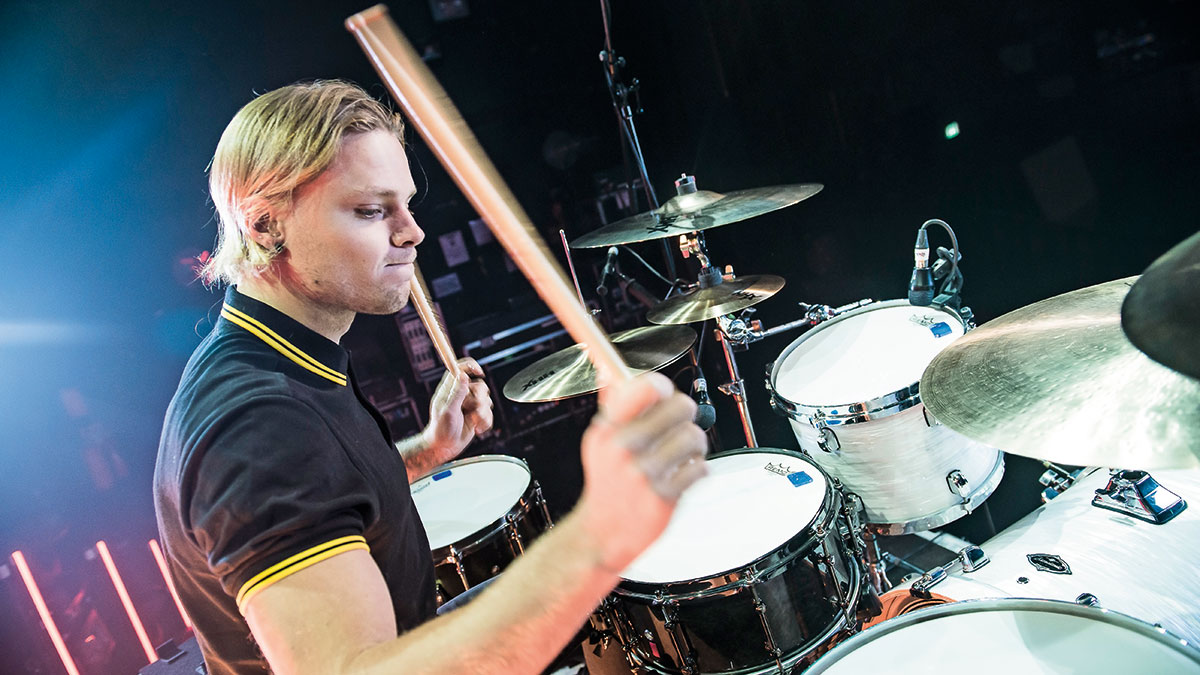
"We wanted to wipe the slate and come back in with a bang."
How difficult has dealing with that wrist pain proven?
“It first came on in February last year while we were on Soundwave, which was the pinnacle of our career to date being a big draw for the festival on the main stage. I felt something go while we were playing and I had to get through the rest of those shows. Then we went into the studio for a month, then did a six week tour of the States and then went and finished the record. That finished in July so during that whole time I was dealing with the pain. I couldn't grip the sticks, I was on cortisone injections, it was pretty excruciating. We had a few months off at the end of last year and I got some help and went to see physios and therapists. I'm on top of it now but I've had to make changes.”
Did it encourage you to revisit your technique?
“Definitely. I've had to revisit a lot of things. I think it's a good thing to drop back in and assess where you're at as a player. Videoing yourself playing really helps. With my old style of playing I went a bit too hard and my posture was out so it added a lot of stress.
“I think before I was more concerned with the image and just being too young. I've matured now, I've learned the hard way but it's all for the best. I've also changed my sticks, I've downsized to the 55As. Before I was using the HD9s which were close to 2Bs. That was just another thing that I had to address because of my wrist troubles. Playing was such a chore with the bigger sticks. You don't realise which stick size is right for you until you've tried them all. You need to figure out what feels best.”
“It was a real frustrating time. We had doctors saying I needed surgery, some saying I didn't."
Have you changed your day-to-day routine on the road to help the injury?
“On the road a huge thing is doing exercises three times a day. That's a lot of stretching and core work. It's also chest, upper back and shoulder work with weights. I only do about 10-15 minutes with the sticks when I warm up now, the rest is stretching and massage. I used to sit down for an hour and do a massive rudiment session before going on stage and playing for an hour and a half. I've reversed what I do and it seems to be working. I wear a brace when I play live as well. I've brought the whole kit in as well.”
It must have been a difficult few months for you
“It was a real frustrating time. We had doctors saying I needed surgery, some saying I didn't. It's been up and down but I'm getting through it. I'm trying to stay off all of the things that the medical professionals try to get you on like the cortisone because I want to be drumming forever.”
How has moving the kit around helped?
“As well as bringing my floor toms in dramatically and my cymbals closer on my right hand side, the key was to make sure there was no point where I was leaning to play. But the main thing was lowering my hats and my cymbals, raising my throne and tilting my snare back instead of having it flat. Growing up you see these photos of your favourite drummers and you set your kit up like that. Before you know it you've got all of these injuries through not having your kit how is best for you. I want to look after my body and just groove. I'm enjoying playing so much more now.”
It seems like in several ways this album represents a clean slate for you and the band
“It pretty much is and that's how we wanted to treat the album. It is such a new sound for us and we knew we had something special so we wanted to hold back and disappear a little bit for a few months. We wanted a break as well because we've been touring so hard. We wanted to wipe the slate and come back in with a bang.”
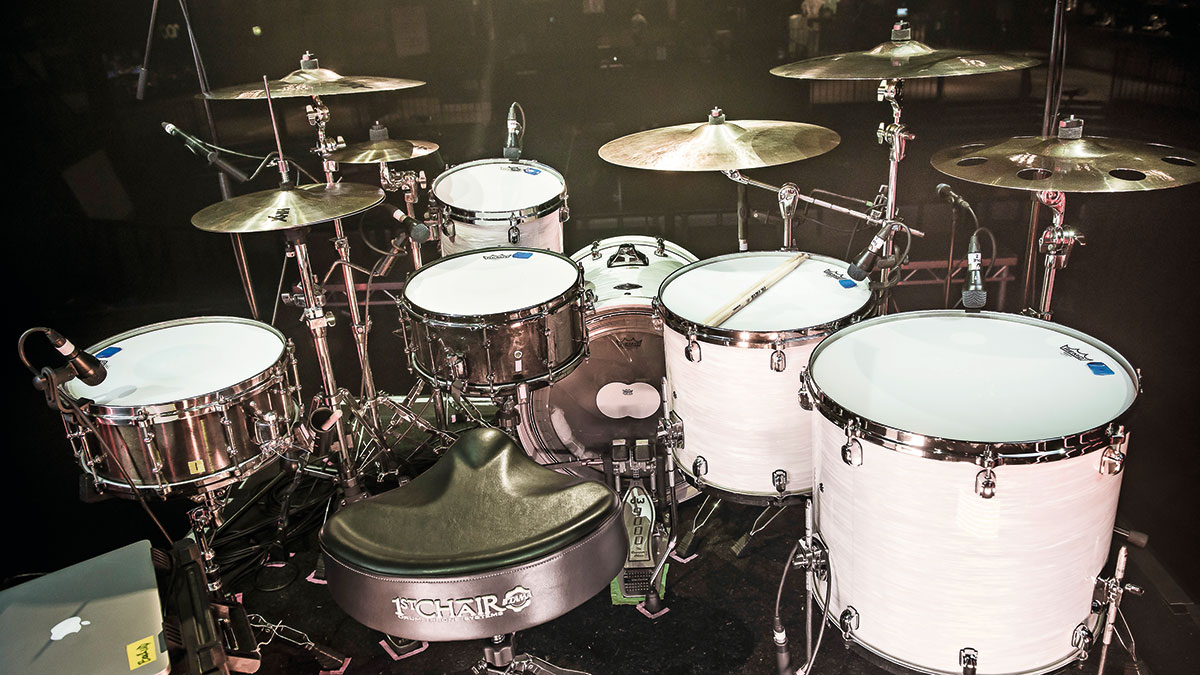
Matt's Kit
Tama Starclassic Bubinga Birch drum kit -White Silk wrap
12”x9” rack tom
16”x16” floor tom
18”x16” floor tom
22”x18” bass drum
14”x6.5” SLP Power Maple snare
14”x6” Warlord bell brass snare
Sabian cymbals
15” Artisan hi-hats
10” HHX O-Zone splash
18” HHX Evolution Trash
19” HHX X-Plosion crash
21” HHX Groove ride
22” HHX Legacy ride
Plus
Remo Coated Emperor heads
Tama hardware
Vic Firth sticks
Rich is a teacher, one time Rhythm staff writer and experienced freelance journalist who has interviewed countless revered musicians, engineers, producers and stars for the our world-leading music making portfolio, including such titles as Rhythm, Total Guitar, Guitarist, Guitar World, and MusicRadar. His victims include such luminaries as Ice T, Mark Guilani and Jamie Oliver (the drumming one).
